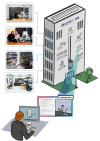Differences
This shows you the differences between two versions of the page.
| Next revision | Previous revisionNext revisionBoth sides next revision | ||
| team:daniel_nyga [2013/06/25 08:18] – created pmania | team:daniel_nyga [2013/07/03 15:23] – [About] nyga | ||
|---|---|---|---|
| Line 1: | Line 1: | ||
| ~~NOTOC~~ | ~~NOTOC~~ | ||
| - | =====Daniel Nyga====== | + | =====Daniel Nyga, M.Sc. (TUM)====== |
| ^ {{: | ^ {{: | ||
| |::: ||Research Staff\\ \\ || | |::: ||Research Staff\\ \\ || | ||
| Line 9: | Line 9: | ||
| |:::| || | |:::| || | ||
| - | ====== About ====== | + | ====About==== |
| + | Before I joined the Institute for Artificial Intelligence, | ||
| + | I'm working on the import of action-specific knowledge from the World Wide Web into the knowledge bases of our mobile robots. In particular, my current research focuses on understanding natural language, in order to enable a robot to autonomously acquire new high-level skills by querying web pages such as eHow.com or wikiHow.com. | ||
| + | |||
| + | My work aims at building up action-specific knowledge bases from various knowledge sources, such as natural language, interactive computer games, observations of humans performing everyday activity or experience data of a robot. | ||
| + | |||
| + | {{research: | ||
| + | |||
| + | Knowledge about actions and objects is represented as // | ||
| + | |||
| + | If you are interested in a student project in any of the above topics, please contact me via E-Mail or just drop into my office. | ||
| + | |||
| + | ====Fields of Interest==== | ||
| + | * Artificial Intelligence | ||
| + | * Probabilistic Knowledge Processing | ||
| + | * Machine Learning | ||
| + | * Statistical Relational Learning | ||
| + | * Data Mining/ | ||
| + | * Automated Learning/ | ||
| + | * Natural-Language Understanding | ||
| + | |||
| + | ====Teaching==== | ||
| + | * Foundations of Artificial Intelligence ([[https:// | ||
| + | * Technical Cognitive Systems (Lecture & Tutorial, @TUM) ([[https:// | ||
| + | * Techniques in Artificial Intelligence (Tutorial, @TUM) ([[https:// | ||
| + | * Discrete Probability Theory (Tutorial, @TUM) ([[http:// | ||
| + | |||
| + | ====Supervised Theses==== | ||
| + | * Web-enabled Learning of Models for Word Sense Disambiguation (Bachelor Thesis, Stephan Epping) | ||
| + | * Grounding Words to Objects: A Joint Model for Co-reference and Entity Resolution Using Markov Logic Networks for Robot Instruction Processing (Diploma Thesis, Florian Meyer) | ||
| ====== Publications ====== | ====== Publications ====== | ||
Prof. Dr. hc. Michael Beetz PhD
Head of Institute
Contact via
Andrea Cowley
assistant to Prof. Beetz
ai-office@cs.uni-bremen.de
Discover our VRB for innovative and interactive research

Memberships and associations:











